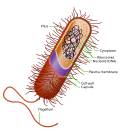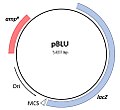Bacteria (redirect from Eubacteria)
prokaryotic life to consist of two separate domains, originally called Eubacteria and Archaebacteria, but now called Bacteria and Archaea that evolved independently...
144 KB (15,602 words) - 04:36, 16 December 2024
(Animalia, Plantae, Fungi, Protista, Archaea/Archaebacteria, and Bacteria or Eubacteria), while textbooks in other parts of the world, such as Bangladesh, Brazil...
74 KB (4,819 words) - 10:10, 4 November 2024
Marine botany (section Eubacteria)
subkingdoms: Eubacteria and Archaebacteria. Eubacteria include the only bacteria that contain chlorophyll a. Not only that, but Eubacteria are placed in...
7 KB (752 words) - 07:49, 18 October 2024
cellular life Prokaryota / Procarya (Monera) Bacteria Bacteria Monera Eubacteria Bacteria Archaea Archaea Archaebacteria Archaea including eukaryotes Eukaryota...
12 KB (1,293 words) - 15:52, 20 December 2024
body, filament, and hook. The long filament is the organ which helps eubacteria move.[citation needed][citation needed] Eubacterium on www.bacterio.cict...
2 KB (73 words) - 19:42, 2 December 2024
kingdoms 6 kingdoms 7 kingdoms — Protista Prokaryota Monera Monera Eubacteria Bacteria Eubacteria Bacteria Bacteria Archaebacteria Archaea Archaebacteria Archaea...
3 KB (849 words) - 00:52, 25 October 2024
sequences: A reappraisal of evolutionary relationships among archaebacteria, eubacteria, and eukaryotes". Microbiol. Mol. Biol. Rev. 62 (4): 1435–91. doi:10.1128/MMBR...
24 KB (2,445 words) - 21:59, 5 December 2024
sequences: A reappraisal of evolutionary relationships among archaebacteria, eubacteria and eukaryotes". Microbiology and Molecular Biology Reviews. 62 (4): 1435–1491...
24 KB (2,653 words) - 14:36, 28 October 2024
retinal-powered archaeal colonies that absorbed all the green light, leaving the eubacteria that "lived in their shadows" to evolve utilizing the residual red and...
10 KB (1,090 words) - 08:44, 6 November 2024
different kingdoms. Originally his split of the prokaryotes was into Eubacteria (now Bacteria) and Archaebacteria (now Archaea). Woese initially used...
15 KB (1,625 words) - 16:47, 11 December 2024
proposed dividing prokaryotes into the Bacteria and Archaea (originally Eubacteria and Archaebacteria) because of the major differences in the structure...
43 KB (4,131 words) - 03:27, 21 December 2024
Animalia, Plantae, Fungi, Protista, Archaea/Archaeabacteria, and Bacteria/Eubacteria Proposed by Thomas Cavalier-Smith: Animalia, Plantae, Fungi, Chromista...
731 bytes (102 words) - 11:13, 7 March 2024
Animalia, Plantae, Fungi, Protista, Archaea/Archaeabacteria, and Bacteria/Eubacteria. See Kingdom (biology). The six elements most common in biomolecules are...
40 KB (3,817 words) - 05:31, 11 December 2024
are archaea, though some of them are bacteria and fungi. Thermophilic eubacteria are suggested to have been among the earliest bacteria. Thermophiles are...
12 KB (1,251 words) - 13:06, 20 December 2024
sylvanus); A unique endangered primate species struggling to survive. Revista Eubacteria, (30): 1–4. Emmanuel, John (September 1982). "A Survey of Population and...
19 KB (1,947 words) - 06:40, 17 December 2024
mevalonate pathway. The mevalonate pathway of eukaryotes, archaea, and eubacteria all begin the same way. The sole carbon feed stock of the pathway is acetyl-CoA...
9 KB (756 words) - 21:39, 21 November 2023
bacteria). The kingdom Monera can be divided into two distinct groups: eubacteria (true bacteria) and archaebacteria (archaea). In 1977 Carl Woese and George...
37 KB (3,548 words) - 09:51, 24 August 2024
three-domain system: Archaea (originally Archaebacteria); Bacteria (originally Eubacteria); Eukaryota (including protists, fungi, plants, and animals) These domains...
40 KB (4,303 words) - 22:07, 19 November 2024
Bergsland KJ, Haselkorn R (June 1991). "Evolutionary relationships among eubacteria, cyanobacteria, and chloroplasts: Evidence from the rpoC1 gene of Anabaena...
43 KB (5,109 words) - 08:28, 28 October 2024
known). They called these groups the Urkingdoms of Archaebacteria and Eubacteria, though other researchers treated them as kingdoms or subkingdoms. Woese...
159 KB (16,791 words) - 11:16, 21 December 2024
three domains: Archaea (originally Archaebacteria), bacteria (originally eubacteria), or eukarya (includes the fungi, plant, and animal kingdoms). The history...
133 KB (13,837 words) - 22:48, 13 December 2024
another example; it is paraphyletic because it is composed of two Domains (Eubacteria and Archaea) and excludes (the eukaryotes). It is very useful because...
38 KB (3,744 words) - 09:42, 9 December 2024
two steps in the biosynthesis of tryptophan. It is commonly found in Eubacteria, Archaebacteria, Protista, Fungi, and Plantae. However, it is absent from...
14 KB (1,672 words) - 18:42, 3 July 2024
compared to exonuclease activity. Restriction enzymes are endonucleases from eubacteria and archaea that recognize a specific DNA sequence. The nucleotide sequence...
25 KB (2,688 words) - 21:18, 21 November 2024
Miyata, T (December 1989). "Evolutionary relationship of archaebacteria, eubacteria, and eukaryotes inferred from phylogenetic trees of duplicated genes"...
32 KB (3,591 words) - 00:59, 28 August 2024
Haselkorn, Robert (June 1991). "Evolutionary Relationships among the Eubacteria, Cyanobacteria, and Chloroplasts: Evidence from the rpoC1 Gene of Anabaena...
147 KB (15,851 words) - 03:56, 6 December 2024
ampicillin-susceptible E. coli strain to teach students about transformation of eubacteria. It is 5,437 base pairs long. There is a multiple cloning site in the...
780 bytes (66 words) - 11:09, 15 February 2020
Members of the papain family are widespread, found in baculoviruses, eubacteria, yeast, and practically all protozoa, plants and mammals. The proteins...
18 KB (2,006 words) - 08:09, 18 December 2024
stable RNA molecules. RNase D has homologues in many other organisms like eubacteria and eukaryotes, and has been shown to contribute to the 3' maturation...
2 KB (178 words) - 03:37, 8 December 2024
intein-containing genes. While in eubacteria and archaea, there are 289 and 182 currently known inteins. Not surprisingly, most intein in eubacteria and archaea are found...
31 KB (3,821 words) - 22:43, 17 December 2023






















